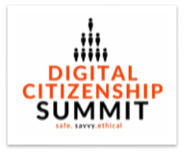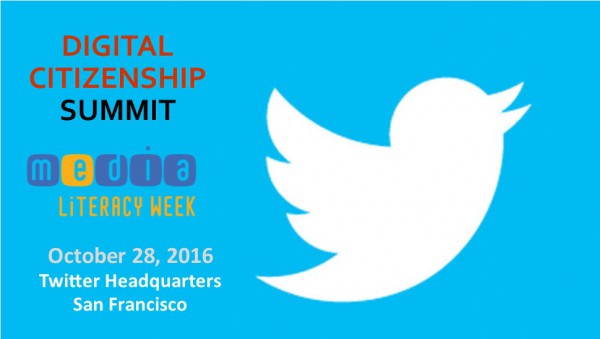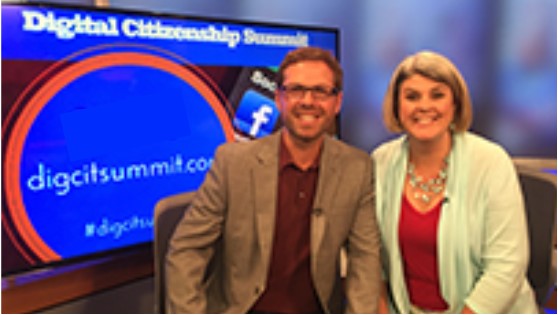Next Digital Citizenship Summit will be at Twitter Headquarters, One Year After Hartford Area Launch
/What a difference a year makes. The Digital Citizenship Summit, launched last year in Greater Hartford at the University of Saint Joseph, will be hosted at Twitter headquarters in San Francisco on October 28 this year, as the launch event for U.S. Media Literacy Week at the social media giant’s global headquarters.
The Digital Citizenship Summit, described as the only global network of summits and projects focused on the safe, savvy & ethical use of social media and tech, was developed locally and has quickly grown internationally, with sessions taking root across the globe. 
A major gathering of organizations, industry, parenting experts, students, and more, will bring together new, well-known, and unexpected voices from a wide variety of backgrounds for a fast-paced and energetic mix of presentations, panels, videos, and awards at Twitter headquarters this fall.
The day will be live-streamed to a large global audience, and seeks to broaden the appeal and accessibility to digital citizenship and media literacy. "Digital Citizenship" has been defined by Dr. Mike Ribble, author of Digital Citizenship in Schools, as "the norms of appropriate, responsible behavior with regard to technology use."
The Digital Citizenship Summit will serve as the kick-off event for Media Literacy Week (October 31-November 4) led by the National Association for Media Literacy (NAMLE). Media literacy “is the ability to access, analyze, evaluate, communicate and create using all forms of media,” and an area of heightened relevance so close to the presidential election.
“We are thrilled to be partnering with the Digital Citizenship Summit and Twitter on this event,” says Michelle Ciulla Lipkin, Executive Director of NAMLE. “We are excited about bringing thought leaders in digital citizenship and media literacy together. There is so much to be done to ensure a media literate world and exploring digital citizenship is a great way to get the conversation going.”
“Society has adopted new social media platforms and technologies before we have collectively had the chance to determine what constitutes safe, savvy, and ethical behavior,” says Digital Citizenship Summit co-founder David Ryan Polgar of West Hartford.
“There are multiple stakeholders who desire an active role in the process, including students, educators, parents, administrators, media specialists, and organizational leaders. All of these groups have crucial insight, and the Digital Citizenship Summit was setup to bring these voices together to solve current issues regarding social media and tech use,” Polgar said.
The issues, according to Polgar, are endless. “Some major areas of concern include how smartphones should or shouldn’t be used in the classroom, finding ways to improve civility online, adjusting to an Internet that never forgets our posts, and being able to determine the veracity of what we read online.”
By bringing together a broad range of experts, organizations, and interested parties, the Digital Citizenship Summit on October 28th aims to take a multi-stakeholder participatory approach to solving some of the vexing issues regarding social media and tech use.
Partnering organizations include the National Association for Media Literacy Education (NAMLE), Common Sense Media, Family Online Safety Institute (FOSI), #iCANHELP, ConnectSafely, iKeepSafe, and Trend Micro’s Internet Safety for Kids & Families.
The inaugural Digital Citizenship Summit in the United Kingdom was held earlier this year and another is already being planned in that nation, and plans are now being developed for similar initiatives in St. Louis as well as Ireland and Australia later this year. A Summit was held in Wisconsin last month.
“We are thrilled to have the involvement of so many prominent organizations,” says co-founder Dr. Marialice B.F.X. Curran. “By collaborating on this event we can expose a wide audience with some incredible resources that can be used at home or in the classroom.” “At the same time,” chimes in her co-founder David Ryan Polgar, “the open and collaborative nature will bring forward new voices that can influence this important conversation around social media and tech use.”
“We want people impacted by tech and social media to feel empowered,” Curran continues. “Instead of being reactive, we want people to be active participants in the digital future. We want people to be the digital change.”
Media Literacy Week (#MediaLitWk) is designed to bring attention and visibility to media literacy education in the United States. Inspired by Canada’s Media Literacy Week, the National Association for Media Literacy Education is leading the efforts to create a media literacy week in the United States to showcase the work of amazing media literacy educators and organizations around the country. The mission of Media Literacy Week is to highlight the power of media literacy education and its essential role in education today.
The Digital Citizenship Summit is a global network of summits and projects focused on the safe, savvy, and ethical use of technology and social media. They are dedicated to creating a new culture in which everyone—particularly the next generation of digital natives, educators and parents—has a voice, and feels empowered to use it. The Digital Citizenship Summit brings diverse groups together to connect in person, join the conversation and take an active role in creating positive digital change on both a local and global level.
The first Digital Citizenship Summit was held on October 3, 2015 at the University of Saint Joseph in Connecticut. It drew over 220 educators, students, parents, administrators, organizations, and members of industry, and trended #1 in the nation (#digcitsummit).






























